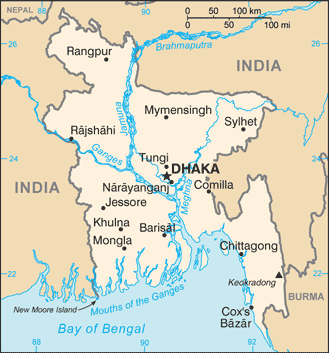
A magistrate court in Gazipur district handed down the sentence to Biplob Marandi, a 25-year-old tribal Christian, on Feb. 28 after he was arrested near the massive Bishwa Ijtema (World Muslim Congregation) on the banks of the Turag River near Tongi on Jan. 21.
A copy of the verdict says that he was sentenced according to Section 296 of Bangladeshi law 1860 for “creating chaos at a religious gathering.”
“Duty police found Marandi creating chaos as he was propagating his religion, Christianity, by distributing the tracts as a mobile court on Jan. 21 was patrolling near the field of the Bishwa Ijtema,” the verdict reads. “The accusation–creating chaos at a Muslim gathering by distributing Christian booklets and tracts–against him was read out in the court before him, and he admitted it. He also told the court that he had mainly wanted to propagate his religion, Christianity.”
The Rev. Sailence Marandi, pastor at Church of Nazarene International in northern Thakurgaon district and older brother of Biplob Marandi, told Compass that there was no altercation when his brother was distributing Christian tracts; likewise, the verdict makes no mention of any confrontation.
“I guess some fanatic Muslims found my brother’s works un-Islamic,” he says. “They created chaos and handed over my brother to the police and the mobile court.”
Marandi says he could not understand how a court could determine that one man could disturb a gathering of hundreds of thousands of Muslims.
“Fanatic Muslims might say this impossible thing, but how can the honorable court can say it?” he says. “In the verdict copy it is written that my brother admitted his offense in the court. This case being very religiously sensitive, I suspect that his confession statement might have been taken under duress.”
Marandi says his brother was selling Christian books to supplement his livelihood as an evangelist on a street near the event, and there were many curious pedestrians of all faiths among Muslims from around the world.
“Where there were more people, he would go there for selling books and distributing Christian tracts,” he says.
The pastor says he was surprised that his brother was convicted and sentenced so quickly.
“My brother did not get the chance for self-defense in court,” he says. “Without opportunity for self-defense, sentencing him for one year for evangelical activities was a travesty of justice. It cannot be accepted in a democratic country.”
He adds that the family hired a Muslim lawyer for Marandi who did little for him.
“If he had worked, then there would have been cross-examination regarding the confession statement,” Marandi says. “I think that some Muslim fanatics could not tolerate his evangelical activities near the religious gathering place and handed him over.”
The family has since hired a Christian attorney, Lensen Swapon Gomes, who told Compass that he filed an appeal on Monday (March 21) as Marandi’s religious activities were protected by the religious freedom provisions of the country’s constitution.
“I appealed to the court for his bail and also appealed for his release from the one-year punishment,” says Gomes. “I hope that the honorable court will consider his case, because he is an innocent man and a victim of circumstances. The offense for which he is convicted is bailable.”
The Bangladeshi constitution provides the right for anyone to propagate their religion subject to law, but authorities and communities often objected to efforts to convert people from Islam, according to the U.S. Department of State’s 2010 International Religious Freedom report.
Every year several million male Muslims–women are not allowed–attend the event to pray and listen to Islamic scholars from around the world. Some 9,000 foreigners from 108 countries reportedly attended the event, but most of the worshippers are rural Bangladeshis. About 15,000 security personnel were deployed to maintain order.
Bangladeshi Muslims equate the annual event with the Hajj, the Islamic pilgrimage to Mecca in Saudi Arabia. This year the Bangladesh event was held in two phases, Jan 21-23 and Jan. 28-30.
Jagadish Edward, academic dean of Gloria Theological Seminary in Dhaka, told Compass that Marandi had engaged in evangelical work after completing three years at the seminary in 2005. Marandi had come to Dhaka from northern Thakurgaon district some 400 kilometers (249 miles) away.
“He was very polite and gentle,” says Edward. “As an evangelist, he knew how to respect other religions. I was really surprised when I heard he was arrested and sentenced for one year.”
At the same event in 2009, Muslim pilgrims beat and threatened to kill another Bible school student as he distributed Christian literature. A patrolling Rapid Action Battalion elite force rescued Rajen Murmo, then 20, a student at Believers’ Church Bible College, on Feb. 1, 2009.
Bangladesh is the world’s third-largest Muslim-majority nation, with Muslims making up 89 percent of its population of 164.4 million, according to Operation World. Christians are less than 1 percent of the total, and Hindus 9 percent.














































